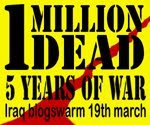A Plunge from the Moral Heights
From Richard Cohen in The Washington Post today:
The recent revelations that the Justice Department prepared memos parsing what is and what is not torture brings to mind regimes that, well, I would rather not bring to mind. These are the torturers of the world, although they deny it, and to bolster their lie they produce copious laws against the practice.
Attorney General John Ashcroft, whose Justice Department prepared the memos -- one of them running to 50 pages and signed by Jay S. Bybee, then head of the Office of Legal Counsel -- assured the Senate the other day that the memos are of no consequence. They were only internal Justice Department stuff, the scribblings of lawyers and -- most important -- the president has not "directed or ordered" torture, Ashcroft said. In another administration, such an assurance would be enough for me, but given this one's cavalier approach to civil liberties, I have to note that "directed" or "ordered" is not the same as condoned. That's what I wonder about.
I wonder, too, why the much-pressed Justice Department -- all those news releases to get out extolling Ashcroft -- went to all the trouble of coming up with definitions of torture that might be permissible under U.S. law when no one was supposedly considering torturing al Qaeda prisoners in the first place. A 50-page memo is not an hour's work. It's clear someone had torture in mind. The Defense Department and the CIA were looking for guidance.
In a way, you can understand why. The memos followed -- sometimes by more than a year -- the terrorist attacks of Sept. 11, 2001. What if the CIA got its hands on a terrorist who it thought might have information about coming attacks? What should it do? What could it do? Could it, say, torture the guy a little bit -- not too much, mind you -- so he would cough up the information? In one of the memos leaked to The Post, the Justice Department said yes, precisely -- torture, but only a bit. "For purely mental pain or suffering to amount to torture, it must result in significant psychological harm of significant duration, e.g., lasting for months or even years." This is a very odd -- shall we say "tortured" -- definition.
My dictionary, compiled by lexicographers and not, thank God, by lawyers, knows precisely what torture is. "To bring great physical or mental pain upon another," is one of several definitions. Simple. Had the CIA or the Pentagon turned to a Boy Scout troop or a gathering of Future Farmers of America, they would have said something similar. They also might say that, given human nature, it is as preposterous to talk about a little bit of torture as it is to talk about a little bit pregnant. This sort of stuff isn't possible to contain, and before you know it, a little torture is a lot of torture -- and who's to say at the moment whether the psychological "harm" cited in the memo is going to last a week or a lifetime? A little bit of torture can go a long, long way.
The Bush administration constantly reminds us that there's a war on. That's wrong. There are two. One is being fought by soldiers in combat, and the other is being fought for the hearts and minds of people who are not yet our enemies. However badly the administration has botched the first war -- where, oh where, is Osama bin Laden? -- it has done even worse with the second. It has jutted its chin to the world, appeared pugnacious and unilateralist, permitted the abuse of POWs and others at Abu Ghraib, and now toyed in some fashion with torture. The Bush administration has shamed us all, reducing us to the level of those governments that also have wonderful laws forbidding torture, but condone it anyway.


|